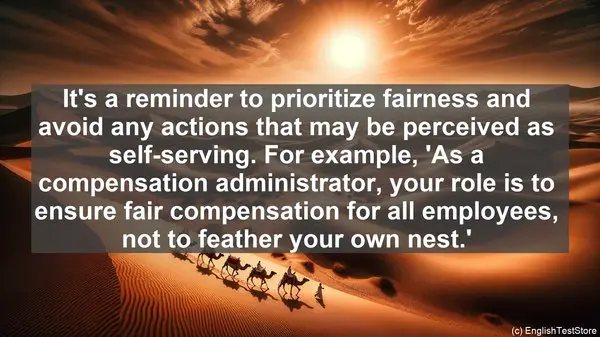1. ‘The Bottom Line’
As a compensation administrator, you’re responsible for managing budgets and ensuring financial efficiency. This idiom, ‘the bottom line,’ refers to the ultimate result or the most important factor. It’s often used to emphasize the financial aspect of a decision or situation. For example, ‘When it comes to compensation, the bottom line is to attract and retain top talent.’
2. ‘Pay the Piper’
Compensation administration involves dealing with various financial obligations, such as salary payments and benefits. The idiom ‘pay the piper’ means to face the consequences of one’s actions, often in a financial sense. It reminds us that every decision or action has a cost associated with it. For instance, ‘If we want to attract top candidates, we have to be willing to pay the piper.’
3. ‘Golden Handcuffs’
In the realm of compensation, ‘golden handcuffs’ refers to financial incentives or benefits that are so attractive that they discourage employees from leaving a company. It signifies the idea that even though an employee might be dissatisfied in some aspects, the financial rewards make it difficult for them to consider other options. For example, ‘The company’s generous stock options act as golden handcuffs for many employees.’
4. ‘In the Red’
As a compensation administrator, you’re constantly monitoring the financial health of your organization. The idiom ‘in the red’ is used to describe a situation where a company or individual is operating at a financial loss or has negative cash flow. It’s the opposite of ‘in the black,’ which means being financially profitable. For instance, ‘Last quarter, our department was in the red due to increased expenses.’
5. ‘Feather One’s Nest’
Compensation administration involves ensuring fair and equitable distribution of resources. The idiom ‘feather one’s nest’ means to accumulate wealth or resources for personal gain, often through unethical means. It’s a reminder to prioritize fairness and avoid any actions that may be perceived as self-serving. For example, ‘As a compensation administrator, your role is to ensure fair compensation for all employees, not to feather your own nest.’
6. ‘Cut Corners’
While managing compensation, it’s essential to adhere to legal and ethical standards. The idiom ‘cut corners’ means to take shortcuts or bypass necessary steps, often to save time or money. However, it implies compromising on quality or integrity. For instance, ‘We can’t cut corners when it comes to compliance with labor laws.’

7. ‘Bread and Butter’
In the context of compensation, ‘bread and butter’ refers to the essential or primary source of income. It signifies the core aspects of compensation that are crucial for employees’ livelihood. For example, ‘While bonuses are great, the base salary is the bread and butter for most employees.’
8. ‘Tighten One’s Belt’
During challenging times, such as economic downturns, compensation administrators may need to make adjustments. The idiom ‘tighten one’s belt’ means to reduce expenses or live more frugally. It’s a reminder to be mindful of financial constraints and make necessary changes. For instance, ‘Given the current market conditions, we might have to tighten our belt and reduce discretionary spending.’

9. ‘On the Same Page’
Effective communication is crucial in compensation administration, especially when working with different stakeholders. The idiom ‘on the same page’ means to have a shared understanding or agreement on a particular matter. It emphasizes the importance of alignment and avoiding misunderstandings. For example, ‘Before implementing any changes to the compensation structure, it’s essential to ensure that all key stakeholders are on the same page.’
10. ‘Dot the I’s and Cross the T’s’
Attention to detail is vital in compensation administration, where accuracy and precision are paramount. The idiom ‘dot the i’s and cross the t’s’ means to be meticulous and thorough in completing tasks, leaving no room for errors or oversights. For instance, ‘Before finalizing the compensation report, make sure to dot the i’s and cross the t’s to avoid any discrepancies.’
